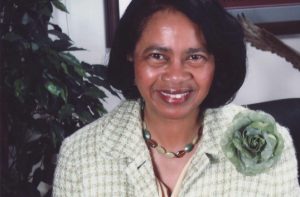 The passing of Dr. Beverly Washington Jones on July 19, 2020 presents the History Department an opportunity to celebrate the accomplishments of its African American alumni and to reflect on the important work that remains in promoting diversity, racial justice and gender equity within the department and beyond. Jones, a 1980 graduate of our Ph.D program, was a historian of twentieth century African American history, with a focus on antiracist and antisexist activism. Her five books include Quest for Equality: The Life and Writings of Mary Eliza Church Terrell, 1863-1954 (Carlson Publishers, 1990) and Durham’s Hayti (Arcadia, 1999), which she coauthored with Andre D. Vann. In her study of the remarkable career of Terrell, an important civil rights activist and educator in the Latin Department at New York’s M Street School, Jones charts a transformation in Terrell’s activism against racial discrimination, from one based on dialogue and moral persuasion to an embrace of more militant direct action, such as protests and boycotts. Quest for Equality highlights what historians now call the intersectionality of racism and sexism in Terrell’s biography and outlook—putting both Terrell and Jones ahead of their time.
The passing of Dr. Beverly Washington Jones on July 19, 2020 presents the History Department an opportunity to celebrate the accomplishments of its African American alumni and to reflect on the important work that remains in promoting diversity, racial justice and gender equity within the department and beyond. Jones, a 1980 graduate of our Ph.D program, was a historian of twentieth century African American history, with a focus on antiracist and antisexist activism. Her five books include Quest for Equality: The Life and Writings of Mary Eliza Church Terrell, 1863-1954 (Carlson Publishers, 1990) and Durham’s Hayti (Arcadia, 1999), which she coauthored with Andre D. Vann. In her study of the remarkable career of Terrell, an important civil rights activist and educator in the Latin Department at New York’s M Street School, Jones charts a transformation in Terrell’s activism against racial discrimination, from one based on dialogue and moral persuasion to an embrace of more militant direct action, such as protests and boycotts. Quest for Equality highlights what historians now call the intersectionality of racism and sexism in Terrell’s biography and outlook—putting both Terrell and Jones ahead of their time.
Though neither of her parents completed high school, Jones and her ten siblings all went to college. After earning her undergraduate and master’s degrees at North Carolina Central University (NCCU), Jones became the first African American woman to earn a doctorate in history at UNC Chapel Hill, where her dissertation committee included Jacquelyn Hall, Frank Klingberg and her adviser, Joel Williamson. The bulk of her career was spent at NCCU, where, in addition to advancing her pathbreaking scholarship, she occupied numerous administrative roles, including Provost and Vice Chancellor for Academic Affairs, Dean of University College, Director of the Institute for the Study of Minority Issues, and director of the Saturday Academy, an academic enrichment program for third through fifth graders. In 2007, she became the university’s interim chancellor. In recognition of her accomplishments and the importance of her example for younger scholars and professionals, Dr. Jones was named one of the 25 Most Influential Black Women in Business by The Network Journal, New York tri-state area’s premier business magazine for African-American professionals.
Jones is remembered as an engaging and passionate student and scholar during her time at UNC. Jacquelyn Dowd Hall recalls that Dr. Jones took a seminar with her on oral history in the mid-1970s. This research focused on a strike by UNC food workers, and, as Hall recalls, Jones did some of the key interviews, which have been used and cited by historians ever since. Jones also conducted interviews with female tobacco workers in Durham, which formed the basis of an important 1984 article in the journal Feminist Studies.
As UNC reckons with its own complex history of struggling against racism while also sustaining it, the department celebrates the small role it played in fostering an environment conducive to Jones’s scholarship, while acknowledging the many obstacles that impeded, and that continue to stand in the way of, African American historians and scholars such as Jones. Her career epitomizes the department’s widely held goal of using the study of the past to advance justice and equity in the present. “Black history is much more than just reminiscing about the past,” Jones told the News & Observer in 1995. “It’s really an attempt to look at the dilemma facing African Americans and other minorities.”
